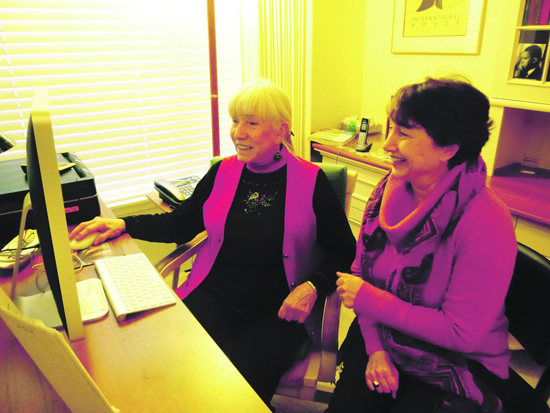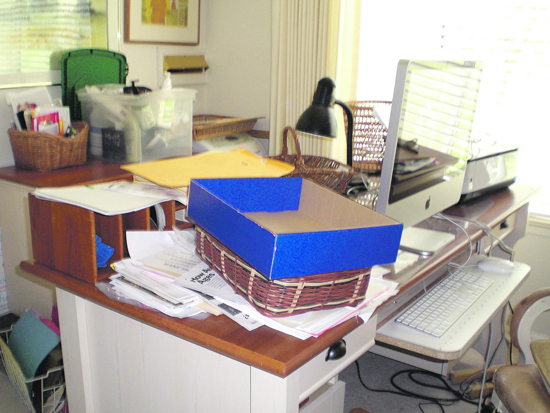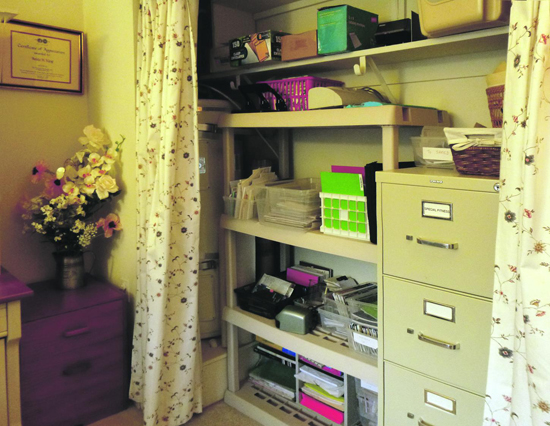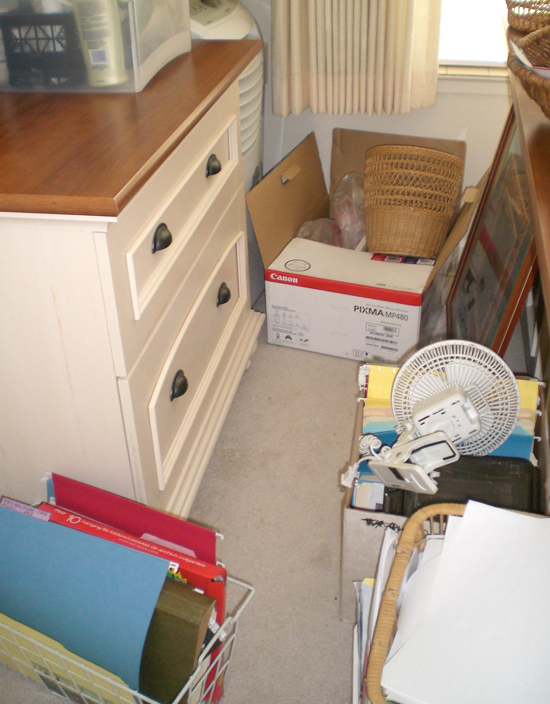| | Published January 1st, 2014
| Organization for the Naturally Disorganized
| | By Sophie Braccini |  | | Christine Dodier (right) and "Jennifer" organizing the computer files. Photos Sophie Braccini
|
The beginning of the year is a great opportunity to look at things with a fresh perspective and decide to improve one's life. One area is the organization of the home. For some, this is a simple process that can take a couple hours by defining a private space, adding shelving, or filing cabinets. For others who might be stressed by a busy professional life, are going through a tough life transition, or are naturally disorganized, it is a major hurdle, especially for the long term.
 One local resident, who asked to be called "Jennifer" for this article, decided she needed extra help to get a handle on things and move forward with her life. Letting go, clearing up space, and putting simple systems in place made a major difference for her.
One local resident, who asked to be called "Jennifer" for this article, decided she needed extra help to get a handle on things and move forward with her life. Letting go, clearing up space, and putting simple systems in place made a major difference for her.
 The retired stress management professional, who had traveled the planet, was at a point where she was no longer able to let go of material things around her. "It was like giving away some of my life," she said. After the loss of her husband, and raising a disabled child, then downsizing to a smaller space, Jennifer had the feeling that her brain was like a messed up ball of yarn, "like when a kitten has been playing with it," she said, "and I needed help slowly pulling the strings one after the other and getting a handle on things."
The retired stress management professional, who had traveled the planet, was at a point where she was no longer able to let go of material things around her. "It was like giving away some of my life," she said. After the loss of her husband, and raising a disabled child, then downsizing to a smaller space, Jennifer had the feeling that her brain was like a messed up ball of yarn, "like when a kitten has been playing with it," she said, "and I needed help slowly pulling the strings one after the other and getting a handle on things."
 She found the help she needed with Christine Dodier, an interior designer and personal assistant who owns Spaces in Place in Lafayette. Dodier started working with Jennifer a few hours every week, reorganizing the space and setting in place what she calls simple systems.
She found the help she needed with Christine Dodier, an interior designer and personal assistant who owns Spaces in Place in Lafayette. Dodier started working with Jennifer a few hours every week, reorganizing the space and setting in place what she calls simple systems.
 "Some people need help once to solve a specific problem, but there are others who have been struggling with organization for longer periods of their lives, for various reasons, and are going to require a little more support," said Dodier. She explains that people who need extra help have often experienced one of these three situations: disorganization has been a factor in life for many years; the level of disorganization interferes with the quality of life on a daily basis or affects relationships with others in house; or disorganization persists despite attempts to change.
"Some people need help once to solve a specific problem, but there are others who have been struggling with organization for longer periods of their lives, for various reasons, and are going to require a little more support," said Dodier. She explains that people who need extra help have often experienced one of these three situations: disorganization has been a factor in life for many years; the level of disorganization interferes with the quality of life on a daily basis or affects relationships with others in house; or disorganization persists despite attempts to change.
 Dodier worked with Jennifer to get boxes out of storage, a few at a time, and sort through them, but Dodier never told her to get rid of something, only asked her to consider it. "Sometimes it would take me a few days to get ready after she planted the seed," Jennifer said. "It was like clearing the deck for the next phase of my life."
Dodier worked with Jennifer to get boxes out of storage, a few at a time, and sort through them, but Dodier never told her to get rid of something, only asked her to consider it. "Sometimes it would take me a few days to get ready after she planted the seed," Jennifer said. "It was like clearing the deck for the next phase of my life."
 Dodier asks clients to think about the big picture. What is the goal? "You may want to organize your desk because you want to write a book, or organize the kitchen to have a healthier lifestyle. Higher goals are conducive to higher motivation," she said. "First we create new habits, and only then we find the shelving or the cabinets that will fit." Dodier acknowledges that getting more organized is a journey, and that there can be backsliding. "It is a commitment, and you need to have compassion for yourself." She breaks down tasks into small commitments, gives homework so clients can practice the new skills, and then she builds on them, one step at a time.
Dodier asks clients to think about the big picture. What is the goal? "You may want to organize your desk because you want to write a book, or organize the kitchen to have a healthier lifestyle. Higher goals are conducive to higher motivation," she said. "First we create new habits, and only then we find the shelving or the cabinets that will fit." Dodier acknowledges that getting more organized is a journey, and that there can be backsliding. "It is a commitment, and you need to have compassion for yourself." She breaks down tasks into small commitments, gives homework so clients can practice the new skills, and then she builds on them, one step at a time.
 Dodier looked at Jennifer's living room and made simple adjustments to clear paths and increase circulation, and they worked together on a color scheme. Then they tackled Jennifer's office, focusing on information circulation. "Christine helped me with organization of my computer files," explains Jennifer. "For example, we created a file for my medications where I record what I take, the frequency and the purpose. That allows me to interact better with the pharmacist and doctors."
Dodier looked at Jennifer's living room and made simple adjustments to clear paths and increase circulation, and they worked together on a color scheme. Then they tackled Jennifer's office, focusing on information circulation. "Christine helped me with organization of my computer files," explains Jennifer. "For example, we created a file for my medications where I record what I take, the frequency and the purpose. That allows me to interact better with the pharmacist and doctors."
 Her mail now goes directly into a receiving basket in her office, ready to be sorted. Each aspect of Jennifer's life has a file, with sub-files, all neatly labeled.
Her mail now goes directly into a receiving basket in her office, ready to be sorted. Each aspect of Jennifer's life has a file, with sub-files, all neatly labeled.
 "One very important element is to separate things by project," said Dodier. "It makes working more efficient and keeps the mind and the space clear. It does not have to be absolutely neat, you can have piles, but they have to be organized piles." For very important projects, Dodier recommends dedicating some permanent space that will hold all the elements of the projects.
"One very important element is to separate things by project," said Dodier. "It makes working more efficient and keeps the mind and the space clear. It does not have to be absolutely neat, you can have piles, but they have to be organized piles." For very important projects, Dodier recommends dedicating some permanent space that will hold all the elements of the projects.
 Since her daughter is disabled, Jennifer has worked for years with professionals to develop a video that presents fitness exercises for affected individuals. Her most important project at this time is the publicizing and distribution of the CDs. In her office, a dedicated shelving system holds all the pieces of the project together: the CDs, the files, and all the material to complete the tasks Jennifer has given herself.
Since her daughter is disabled, Jennifer has worked for years with professionals to develop a video that presents fitness exercises for affected individuals. Her most important project at this time is the publicizing and distribution of the CDs. In her office, a dedicated shelving system holds all the pieces of the project together: the CDs, the files, and all the material to complete the tasks Jennifer has given herself.
 "I feel that Christine is giving me courage," said Jennifer, "and I no longer feel lost."
"I feel that Christine is giving me courage," said Jennifer, "and I no longer feel lost."
 Dodier continues to come to Jennifer's house once a week for a few hours, but said this is not always necessary; it depends on the personality and needs of her clients, who sometimes are busy people who simply need help in one area, like the kids' rooms or the kitchen. "I can check in with them on a regular basis, meeting for tune-up sessions, first once a week, or once a month. For some, speaking on the phone can be enough," she said. Dodier believes that being clutter-free in the home reflects how we are inside, and that clearing our space, both mentally and physically, starts with awareness and acknowledging the need to change our habits. Dodier has also worked in partnership with other organizers to help hoarders, "but that is a different field that requires additional sets of psychological skills," she said.
Dodier continues to come to Jennifer's house once a week for a few hours, but said this is not always necessary; it depends on the personality and needs of her clients, who sometimes are busy people who simply need help in one area, like the kids' rooms or the kitchen. "I can check in with them on a regular basis, meeting for tune-up sessions, first once a week, or once a month. For some, speaking on the phone can be enough," she said. Dodier believes that being clutter-free in the home reflects how we are inside, and that clearing our space, both mentally and physically, starts with awareness and acknowledging the need to change our habits. Dodier has also worked in partnership with other organizers to help hoarders, "but that is a different field that requires additional sets of psychological skills," she said.
 For information about Spaces in Place, visit www.spacesinplace.com. For information about Spaces in Place, visit www.spacesinplace.com.

|
 | |
|  | | Dodier recommended transforming the cloth closet into an organizing and storing space. Photos Sophie Braccini
|  | | Dodier is also an interior designer and help "Jennifer" create an inviting and uncluttered living room.
|  | |
| | | | | | | |
| | | print story
Before you print this article, please remember that it will remain in our archive for you to visit anytime.
download pdf
(use the pdf document for best printing results!) | | | Comments | | |
| | | | | | | | | | | | | | | | |






